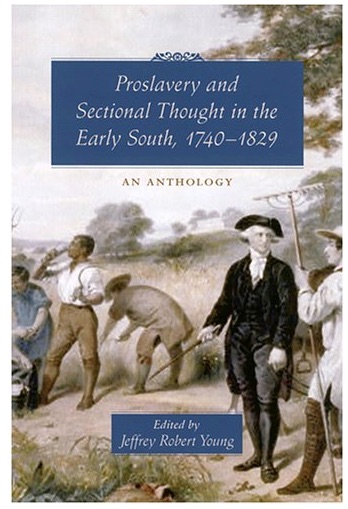In this Virginia History Blog, we feature four titles related to New Nation and Antebellum Virginia. “Jefferson and the Press” charts the professionalism and partisanship of period newspapers, “Murder at Montpelier” documents the introduction and persistence of Igbo culture among the Piedmont’s African-Virginians.
“Proslavery and Sectional Thought” explains the development of organic social theory in Southern worldview, and “Dominion of Memories” charts the political and economic choices leading to Virginia’s decline in the Antebellum period.
Jefferson and the Press

Jerry W. Knudson wrote Jefferson and the Press: Crucible of Liberty in 2006. It is available from the University of South Carolina Press and online used.
Jefferson was perhaps the most vilified President in American press, second only to Lincoln. Knudson makes an overview of the press as it developed in the first decade of the 1800s, and features brief biographies of major Republican and Federalist authors. The earlier colonial printers were replaced by professional partisan editors.
He evaluates the argumentation of the press battles over the principle controversies in Jefferson’s two terms. They range from the election of 1800 itself, to the Louisiana Purchase, contests over the judiciary and the embargo. While initially only a fourth of the published papers supported Jefferson at his first election, over time the Republican papers successfully wrote for the people, and the Federalists “seemed to write for each other”.
To buy “Jefferson and the Press” on Amazon, click here.
*Garrett Ward Sheldon and C. William Hill, Jr. wrote The Liberal Republicanism of John Taylor of Caroline in 2008. It is out of print but available online new and used. To buy “John Taylor of Caroline” on Amazon, click here.

Richard Labunski wrote James Madison and the Struggle for the Bill of Rights in 2006. It is one of the TVH top 300 picks in print. The previous review can be found on the Virginia History Blog “U.S. Constitution in Virginia” and on the webpage dedicated to the historical era here.
It is available from Oxford University Press, on Kindle and online new and used. To buy “James Madison and the Struggle for the Bill of Rights” on Amazon, click here.
Murder at Montpelier

Douglas B. Chambers wrote Murder at Montpelier: Igbo Africans in Virginia in 2008. It is available from University Press of Mississippi and online new and used.
By the 1730s, Chambers finds that Igbos from the Bight of Africa supplanted the earlier African culture of Angolan Christian slaves, and Afro-Virginian culture became “Igboized”. Chambers describes Igbo culture and their Bristol merchant carriers in that slave trade, resulting in an Afro-Virginian culture very distinct from those found in South Carolina or Jamaica.
The murders of the book’s title refer to the convictions of three enslaved Afro-Virginians who had been charged with the murder of Ambrose Madison, the grandfather of James Madison. Throughout the 1700s, the slave community at the family estate was fairly stable, doubling every thirty years and seldom sold until the community was dispersed in the 1850s.
To buy “Murder at Montpelier” on Amazon, click here.
Proslavery and Sectional Thought

Jeffrey Robert Young edited Proslavery and Sectional Thought in the Early South, 1740-1829: An Anthology in 2006. It is available from the University of South Carolina Press and online new and used.
This is a collection of thirteen sources that together relate proslavery thought, Christian activism, and European imperialism in the New World. The key to the development of proslavery thought in the white southern worldview was “organic social theory” as reasoned by Aristotle and Thomas Aquinas, Martin Luther and John Locke. It stressed the relationships of mutual moral responsibilities required of each member of a social hierarchy.
Religious reformers advanced the organic social theory to mitigate the severe practice of slaveholding as it had developed with the hope that the slaves might be better treated and Christianized. Following the American Revolution, southern slave holders themselves increasingly conceived their mastery over slaves in terms of a benevolent family. They nevertheless adopted a racism that increasingly isolated the South from mainstream thought in western nations.
To buy “Proslavery and Sectional Thought” on Amazon, click here.
Dominion of Memories

Susan Dunn wrote Dominion of Memories: Jefferson, Madison and the Decline of Virginia in 2007. It is one of the TVH top 300 Survey History Bibliography picks. It is available from Basic Books, on Kindle and online new and used.
From the richest state with the largest population, producing not only the tobacco cash crop, but also the most pig iron in the nation, Virginia became “poor on principle,” as Philip Nicholas declared in the General Assembly in 1829. Here, Susan Dunn chronicles Virginia’s deliberate legislative choice over decades to throttle enterprise and industrial development.
James Madison’s efforts to promote the development necessary to keep up with the North made him a pariah in his home state by 1828. Virginia declined in population by the tens of thousands every decade throughout the Antebellum period, choosing agricultural methods that depleted its soil and so destroyed its very wealth producing capacity. The reactionary plantation elite held a gerrymandered General Assembly in its thrall, one that finally chose destructive civil war in a lost cause from its first beginnings.
To buy “Dominion of Memories” on Amazon, click here.
Additional history related to Virginia during this time period can be found at the Table of Contents of TheVirginiaHistorian website on the page for Antebellum, Civil War and Reconstruction, 1820-1883. Titles are organized by topics, political and economic Virginia, social history, gender, religious, African American, and Wars in Virginia 1750-1824.
General surveys of Virginia History can be found at Virginia History Surveys. Other Virginia history divided by topics and time periods can be found at the webpage Books and Reviews.
Note: Insights for these reviews include those available from articles in the Virginia Magazine of History and Biography, the William and Mary Quarterly, the Journal of the Civil War Era, the Journal of Southern History and the Journal of American History.

